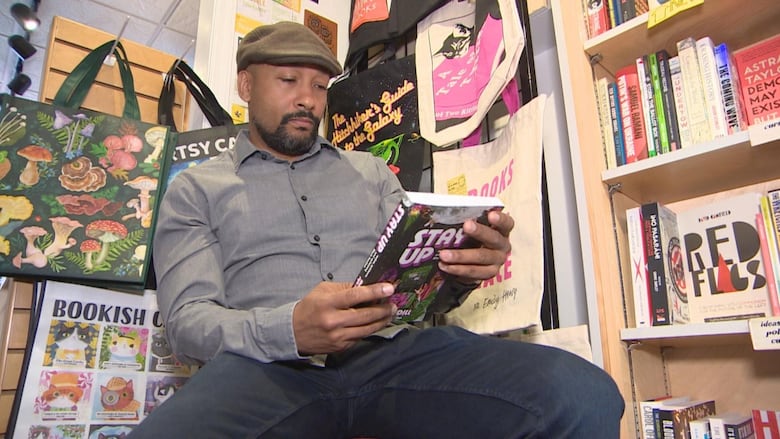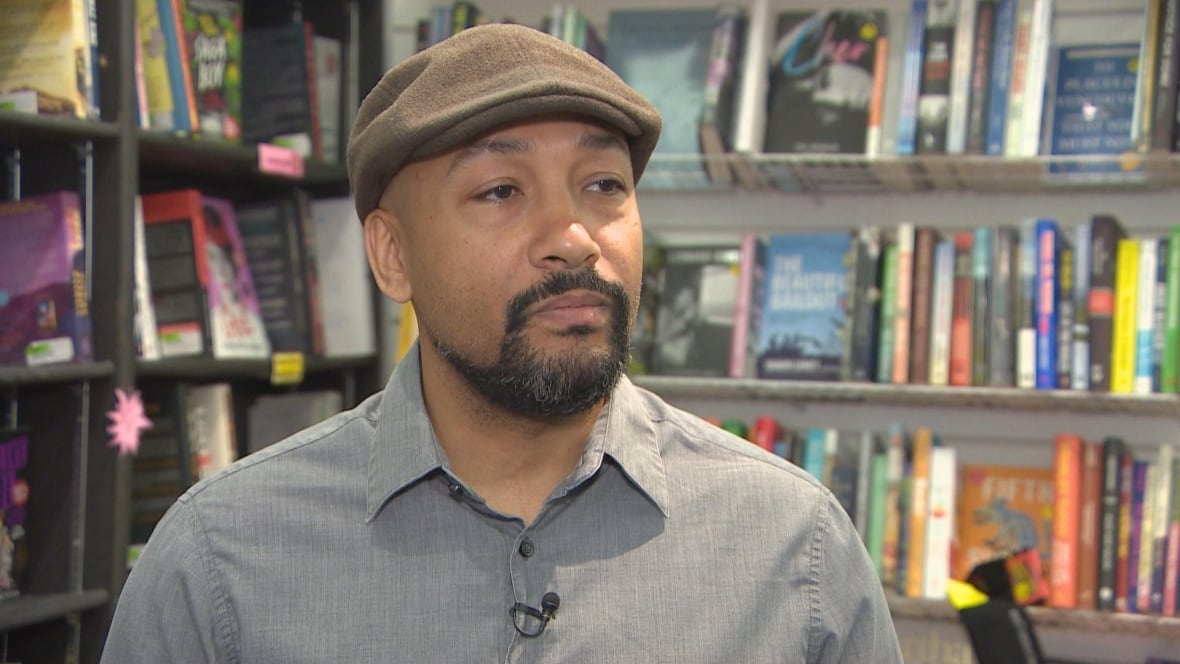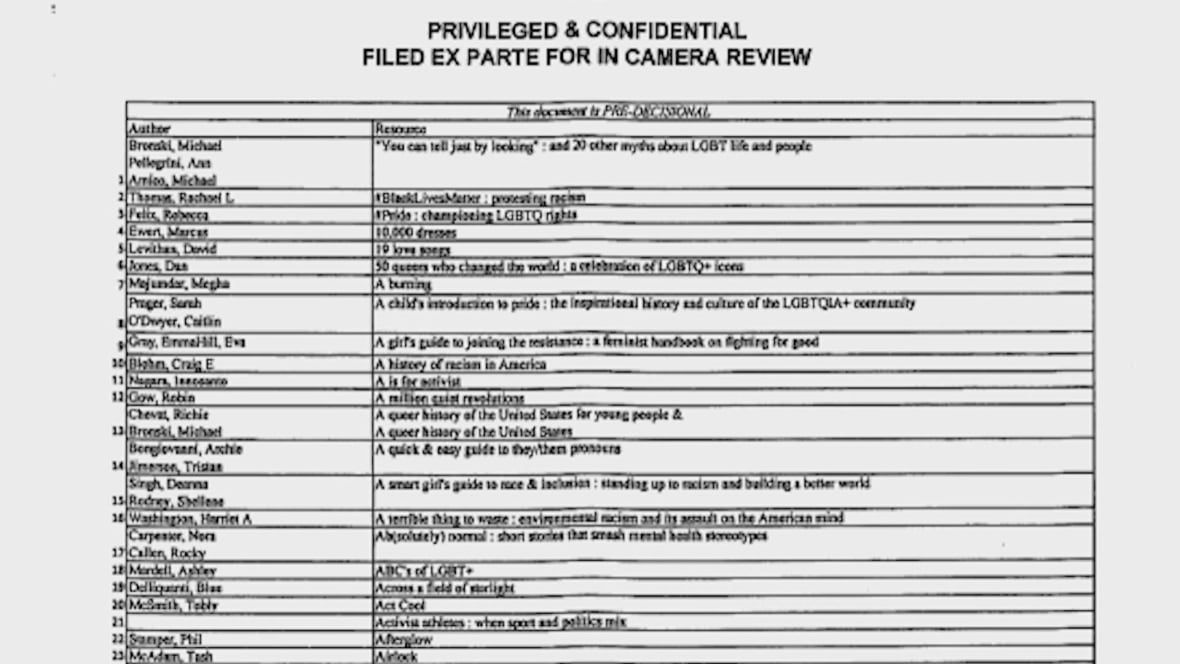Sask. author's anti-racism book is among 596 banned by U.S. Department of Defence for use in its schools
The list of banned books was made public earlier this month

A Saskatoon author is still reeling after finding out his first non-fiction book has been banned by the U.S. Department of Defence for use in its schools.
Khodi Dill's Stay Up: racism, resistance, and reclaiming Black freedom is a book aimed at young adults to act as a primer on anti-racism theory.
It first hit the shelves in the fall of 2023, and uses Dill's experience growing up a Black kid on the Prairies to shed light on how white supremacy functions in North America and to help readers understand how racism impacts their lives.
"A couple of days ago, one of my editors, Khary at Annick Press, reached out to me and told me that he hated to be the bearer of bad news," Dill said.
He was informed students at 161 schools, run by the U.S. Department of Defence, would not have access to his book.

Dill's book is one of 596 that are banned on the department's list, which was made public earlier this month by a federal judge hearing the case of E.K. v. the Department of Defence.
Twelve students currently attending Department of Defence operated schools are suing the department for "scrubbing references to race and gender from its libraries and lessons," according to an April court document.
The students are in grades ranging from pre-kindergarten to high school, within the United States and around the world, according to the document.

"If you were to look at the list of banned books, which is now publicly available, you'll see that a lot of the book titles revolve around things like racism, gender, things like, you know, trying to achieve equity within our society for different groups," Dill said.
"I have a feeling that those are the sorts of ideas that are a little bit more threatening to this administration that's in the U.S. right now."
Dill said a number of Saskatoon teachers have used his book as a tool in the classroom.
However, he has noticed further east, there tends to be a stricter "vetting process" when it comes to the books used for teaching — especially where the N-word is concerned — like in his book.
"Because it examines my experiences as a Black person and examines anti-Black racism in general, it does feature the use of the N-word, " Dill said, adding it is used in a critical way or it's documenting its use against Black people.
Many schools have now implemented policies that have completely banned the use of the N-word for study, he said.
"How do you authentically represent that time period and those atrocities without addressing the language that was used?"
These types of policies contribute to the erasure of Black experiences, he said.
"Yeah, some censorship that might be well-intentioned, but that has some pretty dire consequences in terms of reckoning with the truth and the reality of what has happened and what continues to happen to Black people here in North America."
'Those are red flags': Rutgers professor of sociology
Arlene Stein, a professor of sociology from Rutgers University in New Jersey, said she has had a number of her books flagged for a potential ban by the local government.
Stein has written many research books on subjects relating to gender and sexuality — including one on a campaign in the U.S. against 2SLGBTQ+ rights organized by a Christian organization.
"And in the course of that publication history … local government tried to ban my book," Stein said.
Years later, she was in the process of publishing her book Unbound, which told the story of a transgender man.
"The book was challenged by local library and school board in Galveston, Texas," she said.
Many of the people who make the decisions about these books are doing so in a "very ill-informed way."
"Often they don't even read the books," she said. "They look at titles, if race is in the title, if gender is in the title, if sexuality is in the title … those are red flags."
Stein again pointed to her book Unbound, which she believes was not read before it was challenged.
"They didn't read it and they ended up deciding not to ban it because they didn't want to take the time to read it," she said.
Stein said having access to knowledge is important and that includes the critical knowledge about race — including books like Dill's Stay Up: racism, resistance, and reclaiming Black freedom.
'A chilling effect': PEN America
Kasey Meehan, the program director for Freedom to Read at PEN America, said the organization has been tracking instances of book bans since 2021.
She said books that have been overwhelmingly targeted include those about race, racism, or include characters of colour, 2SLGBTQ+ characters or talk about sexuality and gender or sexual experience.
This stems from "pressure put on school boards or state legislatures that are driving these initiatives down to the schools."
And more recently the federal government is getting involved, Meehan said.
"So it's exactly right that this list of nearly 600 books that have been removed from the Department of Defence schools comes in response to two executive orders that were passed by the Trump administration that restrict discussions of diversity, equity and inclusion."
The impacts have started to trickle down into the literature community, Meehan said.
"It certainly casts a chilling effect across the book industry and across writers and authors."
Public libraries and schools have become more nervous about buying books that may end up on these lists.
It also impacts the authors on these lists, she said. They begin to work under a soft censorship, thinking of how to adapt their work to fit into this atmosphere.
"We should be talking about our history, we should be celebrating all sorts of different identities in our pluralistic society," Meehan said.

